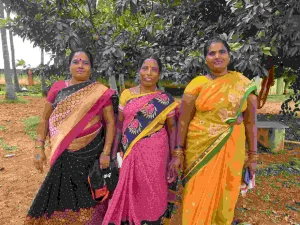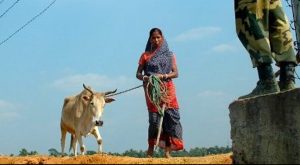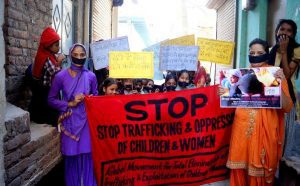With criminal networks, apathetic policing and patriarchal practices turning the impoverished Sundarbans delta region in West Bengal into a trafficking hub, it is now up to the girls from local communities to fight for themselves and other youngsters in danger.
An investigative field visit to Basanti, a town in the state’s south-eastern district of South 24 Parganas located in the delta, showed that acute climate vulnerability and resulting poverty have made the Sundarbans region a lucrative destination for trafficking rings. There is active community collusion in these crimes due to poverty and lack of awareness about child rights and this makes it a hard crime to police, according to activists.
Now, a collective of 30 adolescent girls is working in Basanti to stop sexual abuse and pre-empt human trafficking. Every climate disaster in the region is followed by increased instances of child trafficking, said Lata, 17, a group member from Jharkhali village.
“In the past few years, we have experienced frequent cyclones. Around then, incidents of sexual abuse and child trafficking too increase. People who come to distribute relief material would often harass girls or traffic them on the pretext of providing jobs. Families tend to believe those who offer help in times of economic precarity,” she said.
The Sundarbans, which is home to the world’s largest mangrove forests covering over 4,000 square miles across India and Bangladesh, has experienced frequent floods, fast-rising sea levels, increased salinity and cyclones (see here, and here). While some islands have been inundated due to rising sea levels, land elsewhere often disappears and reappears every day owing to the dramatic tidal shifts.
The area has seen repeated and frequent destruction of homes and livelihood, especially those dependent on agriculture and fishing for a living. Poverty is now endemic in the region — an estimated 37% of the households live below poverty levels here. And trafficking, sexual exploitation and early marriage are now commonly reported in the region, as we detail later.
“In at least 60% of the trafficking cases the traffickers are known to the victims. As a result any amount of monitoring by law enforcement agencies cannot suffice because trafficking happens at the community level,” said Joseph Wesley, head of the anti-child trafficking programme at World Vision India, an international organisation focussed on the rights of women and children. “This is how we identified the need for a community-led initiative to combat trafficking and decided to form girl power groups in the region.”
‘Kept waiting by the police’
The “girl power group”, as the team is referred to, consists of 20-30 girls aged 11 to 18 years. Over 9,300 girls, trained in self-defence, are associated with these groups, set up in 2018, across 65 villages in West Bengal. They are sensitised to child rights, and issues of trafficking and child marriage.
“As soon as we hear of a missing girl, we treat it with utmost urgency,” said Lata of Jharkhali village, whose efforts saved two girls of a family in her neighbourhood from being trafficked earlier this year.
When Lata discovered that the girls aged 9 and 14 had been missing for over two days, she called the toll-free Childline as well as the Jharkhali coastal police station. The police, she said, not only dismissed her fears but also threatened her for making repeated calls.
It was only after she called the inspector in-charge of the police station and the state department for women and child welfare that the police visited her village. But, with the news of impending police action spreading, the father of the girls brought them back home from Bihar where they had been trafficked.
In July 2021, Adrija, 16, went to the police station to file a missing complaint of a girl from her neighbourhood. The police kept her waiting at the station for several hours and then refused to file a complaint on the grounds that the “mandatory 48 hours” had not passed since the girl was last seen. (There is no such rule on filing a missing persons report.) It was later found that the child had been trafficked to Maharashtra and was then rescued at a railway station.
Behanbox spoke to Kakali Ghosh Kundu, inspector in-charge of the women’s police station in Barui district, for a response to allegations of police apathy. She admitted that the police personnel may have refused to or delayed the filing of a complaint. “However, there is a system in place in West Bengal for matters to be escalated to higher authorities or for women’s police stations to be approached for prompt action. I do, however, believe that there is a need to continuously ensure sensitisation of the police forces,” said Ghosh.
Preying on gullibility, vulnerability
Over 37% of the population in South 24 Parganas lives below the poverty line, according to a study by the Ministry of Minority Affairs. And it is this financial distress that drives early marriage and trafficking, said Palash Tarafdar, a facilitator working with girl groups in Sundarbans.
“Except agriculture and fishing, there are no major sources of income. And people here have big families. They find it more lucrative to put their children to work to help supplement the household income, and not send them to school. When it comes to girls, families find it easier to marry them off,” said Tarafdar.
Traffickers also prey on the gullibility of poor families, facilitator Habiba Janida told us. “When someone approaches them with an ‘employment opportunity’ for their children in big cities, they are easily convinced and send their children without further inquiries,” she said.
Early marriage, teen motherhood
There is also a high prevalence of early marriage in West Bengal. Almost 41% of girls aged 20-24 years were married before they reached the legal age of marriage, as per the latest round of the National Family Health Survey. In South 24 Parganas, the figure stood at 42%.
Early marriage is a socially accepted and prevalent custom in the Sundarbans, the girls told us. “Since it is unanimously believed that girls should be married off once they attain puberty, the entire community works to support the family [in arranging the marriage]. Oftentimes community members work to hide the crime,” said Lata.
A child marriage can also be disguised trafficking, said Sandeep Bhowmick, technical specialist at the anti-child trafficking project at World Vision India. “Traffickers meet the family and promise to take care of the girl child and provide her a good life. The parents, who often always consider their girls a burden, agree readily,” he said.
Wesley pointed out that not all teen marriages are forced. The organisation has seen instances of girls asking to marry boys they had met online or otherwise. “Most of them are unaware of their rights, lack the basic life skills, and do not understand the consequences of an early marriage,” he said.
To avoid being called out by the all-girls groups, families often take their daughters to Kolkata on the pretext of visiting relatives and get them married there on the sly, the girls told BehanBox.
“Who will file cases of child marriage when parents themselves are implicated?” asked Sulagna Sarkar, a consultant with World Vision India. She pointed out that earlier, in case of a child marriage, the police would ask families to sign a declaration that the girl would not be sent to her in-laws’ home till she turned 18. “However, the West Bengal State Commission for Protection of Child Rights has now made it mandatory to register an FIR,” she added.
West Bengal has the second highest burden of teenage pregnancy in India – 16% of women aged between 15 to 19 years begin child-bearing, as per NFHS data. This is mostly because teens do not have the agency to resist early pregnancy, activists say.
“When young girls are pushed into marriage, they are forced by their in-laws to conceive within a year’s time. There is no such concept of contraception among these families and the girls cannot say no pregnancy,” said Anjali Gayen, a World Vision volunteer from Ramchandra Khali gram panchayat in Basanti.
Threats and challenges
The girl groups active in the region told us that it is hard to challenge customs that are deeply entrenched, especially since they themselves belong to these communities. They also deal with a lot of opposition from their own parents on their activism.
“Our parents worry for our well-being and believe that if we oppose other members of the community, we will land in trouble,” said Suparna*, a group member.
The panchayat’s word is considered final in cases of child marriage, trafficking, or sexual abuse and this often means a quick “compromise” between the parties. “But ever since the formation of the girl power groups, the panchayats are aware that they will be held accountable,” said Bhowmick of World Vision.
The group also faces hostility from panchayat members for reaching out to the police or District Child Protection Units, said Meena*, another member of the group. “They feel their authority has been overridden so they threaten us and our families with ostracism,” she said. She also alleged instances of collusion between panchayat members, traffickers and the police.
The girls also reported being threatened directly by the traffickers in the region, said Rukhsana*, a teen activist. “Sometimes they threaten us with rape or acid attacks. They threaten our families too and claim to know our whereabouts,” she said.
‘Saved over 500 girls’
World Vision’s Bhowmick claimed that since its inception in 2018, the teen activists of Basanti have prevented over 500 instances of trafficking and child marriage. They have also learned how and who to approach when they wish to report a crime. For instance, if the police are apathetic, they know how to seek out the State Commission for Protection of Child Rights or the District Child Protection Unit.
They have also worked to get 800 girls who had been forced to drop out of school back into classrooms.
“We are now aware of our rights – that we cannot be married off before we turn 18. Girls have now started speaking out against child marriage,” said Seemal*, 16, a Class 12 student and a member of the ‘girl power group’. Increasingly parents of girls who go missing have been approaching members of the group for help, said Meena.
*Names changed to protect identities
[The reporting was facilitated by World Vision India through a media field visit to the deltaic villages of Basanti block in South 24 Parganas district of West Bengal]





